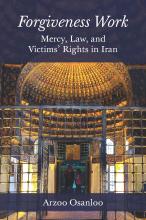By Hunter Kulik
In Arzoo Osanloo’s latest book, Forgiveness Work: Mercy, Law, and Victims’ Rights in Iran, she explores the Iranian criminal justice system’s victim-centered approach in which the decision between forgiveness or retribution lies in the hands of the victim’s families.
Arzoo Osanloo is a legal anthropologist. She holds a JD from the American University, Washington College of Law and a PhD in Cultural Anthropology from Stanford University. Osanloo is a former immigration and asylum/refugee attorney and is currently a Professor in the Law, Societies & Justice Department and the Director of the University of Washington Middle East Center.
Osanloo’s legal experience, combined with observations collected while writing her first book, cultivated an interest in forgiveness in the Iranian criminal justice system. “When I practiced law here in the U.S., I noticed that prosecution for crimes rarely takes into account the personal needs or concerns of victims and if they do, it is only in the sentencing phase,” Osanloo says. When researching her first book, The Politics of Women’s Rights in Iran, Osanloo encountered both legal and cultural acts of forgiveness. In one instance, over 20 years ago, an intentional murder had occurred and a public execution was set during Ramadan, the month of mercy. Approaching the climax of the execution, a hand rose in the crowd of people. It was the father of the victim announcing that he had forgiven the perpetrator and halted the execution. Stories like these intrigued Osanloo and prompted her interest in researching Iranian’s value of forgiveness and its role in dictating punishment in the criminal justice system.
When homicides (or intentional murders, as they are called in Iran) occur, the right of retaliation belongs to the victim and their family, unlike in the United States where the state assumes this right. “What is important is that in Iran, like in the U.S., the system is hybrid – the state and victim both play a role - but that the priorities are different.” A key concern of Forgiveness Work is the Iranian families’ decision to pursue retaliation or forgiveness, which is often based on what they think their deceased loved ones would have wanted.
Osanloo collected stories of forgiveness from victim families, judicial officials, lawyers, prosecutors, and others. “Each introduced me to a different domain of what I came to call ‘forgiveness work,’” she shares. During her research, some judges allowed her to sit-in on cases and even worked with Osanloo to review the nuances of Iranian law. “They did this, I came to understand, because the judges were surprised by the fact that in the U.S. criminal justice system, victims have so few rights and little tangible bearing on the outcome of a case.”
Osanloo found over the course of her ten-year journey collecting data in Iran that the process of forgiving is much more complicated than one might think. Although Iranian criminal codes encourage forgiveness, there are no official guidelines for how to forgo retaliation, yielding an individualized experience for each victim’s family. After a murder, the right of retaliation is inherited by the victim’s family. “There are a wide range of outcomes,” Osanloo explains. “Discussions of forgiveness start right away and forgiveness can actually take place at any time during the process.”
Forgiveness Work examines the merit and complexities of amplifying the voices of victims’ families. Looking back on the experience, Osanloo offers several reflections. “One thing I learned is that families of victims and families of perpetrators need to talk. Often it is not immediate - they need to have time to reflect but also express their anger and grief.” Beyond this, Osanloo recognizes the importance of forgiveness in Iranian cultural traditions. “I learned that this act of forgiveness is not just a single action, it is an everyday practice. It is a way of being,” she explains. “Forgiveness is deeply rooted in many socio-cultural traditions and can be the basis of both individual healing and community reconciliation.”
Since the completion of Forgiveness Work, Osanloo has embarked on a new project concerning international law and sanctions. Given that Iran has been under sanctions for many years, she seeks to understand how these sanctions have impacted civilians. “I am interested to know if sanctions have reshaped social conditions and social relations,” she says. Osanloo has already begun to collect stories from young people in Iran to explore this issue. This summer she hopes to work with the stories she has already compiled. Eventually, Osanloo will visit Iran again for more research and dive back into some of the most under-researched aspects of Iranian culture.
You can read more about Arzoo Osanloo and her work at www.arzooosanloo.com.
